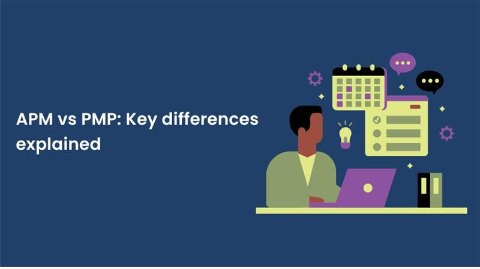Aspiring project managers are frequently faced with deciding which project management certification to pursue. The APM (Association for Project Management) Certification and the PMP (Project Management Professional) Certification are prominent possibilities. Both certificates are valuable in the business, but recognising their distinctions is critical for making an educated selection.
Project management certificates are important in showing an individual’s skill and knowledge in successfully directing and executing projects. The PMP and APM Certifications are generally accepted and respected in the industry. In this blog, you will learn the major differences between APM vs PMP certifications to help you pick the best one for your professional goals.
Table of contents
- APM Certification
- PMP Certification
- Key differences between PMP and AMP certification
- Conclusion
APM Certification
The Association for Project Management, a professional group established in the United Kingdom, offers the APM Certification. It is a thorough certification that covers all elements of project management. The APM focuses on the development of project management skills and knowledge required to effectively deliver projects. It is an excellent option for professionals wishing to improve their project management skills in the UK.
PMP Certification
The Project Management Institute’s (PMI) PMP credential, on the other hand, is an internationally recognised credential that establishes a global standard for project management excellence. The PMP certification is based on a collection of best practices and principles described in the Project Management Body of Knowledge (PMBOK) by the Project Management Institute. It is highly regarded and sought after by employers all around the world.
Key differences between PMP and AMP certification
These are some of the key differences between PMP and AMP certifications.
- Geographical focus: The APM Certification is largely focused on project management practices in the United Kingdom, making it extremely useful to professionals working in that country. The PMP certification, on the other hand, has a global perspective and is recognised and acknowledged across many nations and businesses globally. The PMP certification, on the other hand, has a global view and is recognised and acknowledged across many nations and businesses globally. It is very beneficial for professionals seeking international employment prospects.
- Scope and approach: By covering diverse strategies and approaches, the APM certification gives a broader view of project management. It focuses on project management fundamentals such as planning, budgeting, risk management, and stakeholder involvement. In contrast, the PMP certification follows a structured approach based on the PMBOK, offering a methodical project management foundation.
- Eligibility criteria: The APM Certification is divided into three levels: Introductory Certificate, Project Management Qualification (PMQ), and Advanced Certification. These levels are designed for professionals at various stages of their careers. The PMP certification, on the other hand, necessitates a particular degree of project management experience (usually 3-5 years, depending on educational credentials) as well as a certain number of hours spent managing projects.
- Industry recognition: While both certificates are highly regarded in their respective fields, the PMP certification has achieved a greater global reputation and is frequently required for project management responsibilities in multinational corporations. The PMP is widely regarded as the gold standard in project management qualifications across the world. The APM Certification, on the other hand, is highly valued in the project management business in the United Kingdom. Organisations and employers that respect the APM’s unique approach to project management recognise it.
Conclusion
Both the APM Certification and the PMP Certification have their advantages and disadvantages. The APM certification is appropriate for professionals looking to improve their project management abilities in the United Kingdom, whilst the PMP certification provides an internationally recognised benchmark for project management excellence. Before making a selection, consider your professional objectives, regional location, and level of industry recognition. Finally, the decision between APM and PMP should be guided by your professional goals as well as the unique needs of the roles and sectors in which you wish to work.
